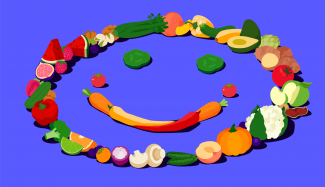Food and Your Mood

Nutrition and mental health, are highly intertwined. When one element is compromised, it is likely that the other is too. When we feel depressed or anxious, our appetite is usually less, so our food intake goes down. Because we are less motivated to cook, we are likely to choose convenience foods and make poor food choices that are less nutrient dense. This can lead to a vicious cycle with mental health.
Many studies have pointed out how lack of nourishment correlates with mental health. Therefore, colorful meals are the best way to enhance your mood and provide the nourishment your body needs. In addition, complex carbohydrates and different sources of proteins are also good options. Complex carbohydrates from whole foods (like sweet potatoes, rolled oats, beans, and quinoa) show an increased availability of the feel-good chemical serotonin in your brain.
Protein (from foods like fish, beef, chicken, turkey, tofu, beans, eggs, and unsweetened yogurt) has been linked to higher levels of dopamine and norepinephrine, brain chemicals that play a role in your mood, motivation, and concentration. Likewise, fruits and vegetables are high in vitamins, minerals, and antioxidants that nourish your body and have also been shown to boost happiness.
The Mediterranean diet has gained attention recently for decreasing symptoms of depression. Researchers suggest that consuming a diet based on whole, unrefined foods with enough protein, healthy fat, and fiber also helps keep blood sugar stable after meals, which has been linked to improved mood and less anxiety. Conversely, eating foods without a lot of nutrients can lead to nutritional deficiencies over time.
What to eat and avoid
Meals that combine protein, fat, fiber, colorful produce, mood-supportive nutrients, and whole-food carbohydrates include:
- Egg quiche with quinoa crust, olive tapenade, and balsamic-marinated tomatoes.
- Quinoa salad with chicken, grapes, and almonds.
- Salmon salad with sundried tomatoes and artichoke hearts in a brown rice wrap.
- Mediterranean bean and veggie soup with pesto.
- Coconut chicken with purple rice and sautéed kale.
- Grass-fed beef with herbed sweet potatoes and roasted broccoli.
Meanwhile, avoid foods that could leave you feeling mentally drained. Some foods with low nutritional value may give you a quick energy boost but could leave you with low energy and mood later. Those include:
- Flour-based foods such as bread, crackers, and baked goods.
- Sugar-sweetened beverages and snacks, such as soda and cookies.
If you are making changes in your diet, be patient. It may take two to three weeks to see an improvement in your mood.
